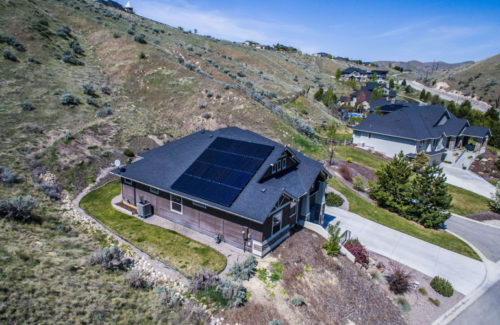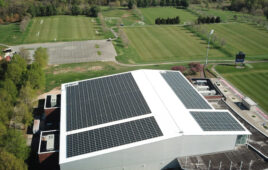The Idaho Public Utilities Commission (PUC) approved on Dec. 29, 2023, a shift to a net-billing system instead of compensation based on a kilowatt-hour-for-kilowatt-hour basis for solar system owners. The vote came after years of public, expert and environmental community pushback and is an approval of Idaho Power’s own internally determined rate calculation. The Sierra Club estimates that the new compensation rate will be 5.96-cents/kWh (down from the already low 8.8-cents/kWh).

An install in Idaho by EGT Solar.
The Dec. 29 approval of the rooftop solar credit system will make the cost of new solar panels unreachable for most Idahoans, potentially crushing local rooftop solar businesses in favor of corporate solar ownership.
“The commissioners are saying the voices and expertise of thousands of Idahoans and small businesses are not as important as the voice of the state’s largest monopoly utility,” said Alex McKinley, Owner of Empowered Solar. “Rooftop solar is an extremely popular and effective way of combating the climate crisis, stabilizing power bills, and putting power back in the hands of everyday people and Idaho Power wants to minimize it.”
The new rooftop solar rate structure took effect on Jan. 1. The net billing structure will use time-adjusted rates calculated on an annual basis by Idaho Power. The expected change in rates should be close to Idaho Power’s original proposal of an average annual export credit rate of 5.96-cents/kWh.
During recent PUC public hearings, not one person testified in favor of the proposal. Idaho Power proposed cutting solar rates based on an internally produced “Value of Distributed Energy Resources Study.” Sierra Club and other environmental groups hired an independent analyst that concluded Idaho Power was severely undervaluing rooftop solar’s value by using selective data.
“The Idaho PUC decision to approve Idaho Power’s solar compensation proposal is very disappointing,” said Mike Engle, Chair at Portneuf Resource Council. “The proposal willfully misleads the public on the value of rooftop solar to Idaho Power, ignores the huge environmental advantages of distributed clean energy and is likely to kill Idaho’s solar industry and the good paying jobs it brings to our state.”
“The decision is a slap in the face to progress, environmental stewardship, and the wallets of our most vulnerable citizens. The PUC chose Idaho Power’s profits over Idaho’s sustainable future and equitable access to clean, renewable energy,” said Leigh Ford, Executive Director of Snake River Alliance. “This isn’t just an attack on local solar businesses; it’s an attack on Idahoans’ right to create our own power.”
On Dec. 28, the PUC also approved a rate increase for Idaho Power customers, partially through increasing the monthly fixed fee called the “service charge.” Idaho Power will double the fixed service charge on all residential customer bills from $5 to $10 in 2024 and then to $15 in 2025, with future additional increases expected. Small commercial customers will see their fee increase from $5 to $25 this year.
Studies show fixed charges are harmful to low-use energy customers — low-income families, rooftop solar owners, and energy conscious households — and disincentivizes energy efficiency, something Idaho Power typically promotes.
“Idaho Power may need to update its rate system as its customer base grows, but doing it through a fixed-charge system is incredibly unjust,” said Lisa Young, Director of Idaho Sierra Club. “Fixed rates are regressive. They disproportionately raise rates on your poorest customers while barely increasing rates for the wealthiest.”
Attacks against solar net metering in 2023 led to real harms to the industry. An unpopular net metering reform in California could lead to the loss of thousands of solar jobs. In neighboring Utah, a conservative Supreme Court upheld a controversial solar credit policy allowing the state’s largest corporate utility to reduce solar compensation.
Idaho Power is proposing the same solar rate changes for its Oregon customer base to the Oregon Public Utilities Commission. In an initial procedural decision, Oregon rejected the plan but Idaho Power will continue pushing.
Organizations pushing back against Idaho Power’s proposals include Idaho Sierra Club, Snake River Alliance, Portneuf Resource Council
Climate Action Coalition of the Wood River Valley, and Empowered Solar.
News item from the Sierra Club







The equivalent of financial rape with a smattering of discrimination. It is dreadfully apparent the the power generated by a unvalued customer is not equal to that generated by the state thieves.
I will be updating my system to prevent these criminals from ever getting power from me
Opposition to solar is an understandable reflex of a critter caught sleeping at the wheel. Getting reluctant IOU’s to see a vision of themselves as a Conductor of a Symphony of IoT errata, instead of the Goliath Electron Generator Powering Everything and Everybody..
The amount the utility pays for power will be irrelevant when the customer gets an electric car. Any excess power will go to charging the car instead of feeding the grid.
Time to punch them in the nose with new technology that aligns the PUC with the USPS, a money losing establishment
Time to punch them in the nose with Off the Grid technology.
It seems that all states public utility commissions tend to side with the utility.
It’s about time that non-solar customers stop subsidizing solar customers who should only receive payment for the value (avoided cost) of the power delivered to the grid.
Solar panels always generate more energy than they take to install and maintain. Having less incentive to install them is a net negative for literally everyone’s pockets except a massive corporation that will lobby for their own self-interests. Please educate yourself on the topic and stop advocating against something that will weaken a monopoly that has no interest in saving their customers money.